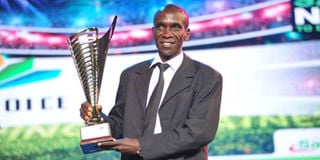Protect us, athletes tell IAAF over rule changes

Sports Personality of the Year Awards (Soya) Sportsman of the Year winner Eliud Kipchoge displays his trophy on January 19, 2017 during the Soya Gala at KICC. PHOTO | CHRIS OMOLLO |
What you need to know:
- Olympic and World 800 metres champion David Rudisha said most athletes changing their citizenship have tangible reasons.
- Athletics Kenya athletes’ representative Milcah Chemos defended athletes who have changed their citizenship.
Some of Kenyan athletes hope the International Association of Athletics Federations (IAAF) will come up with laws that will not infringe on athletes’ rights when it comes to change of nationality.
Athletics Kenya athletes’ representative Milcah Chemos, who defended athletes who have changed their citizenship, said they only need to be guided on their contractual agreements and rights to avoid exploitation.
Olympic marathon champion Eliud Kipchoge hailed to move by IAAF to come up with strict rules on change of citizenship but cautioned that they should not be “dictatorial” to the detriment of the sport and the athletes who want to compete for other countries.
Olympic and World 800 metres champion David Rudisha said most athletes changing their citizenship have tangible reasons and believes that the IAAF’s decision to make it more difficult to transfer allegiance is largely because of the many foreigners who have won important races for their adopted nations.
The athletes’ reactions come after the IAAF Council suspended all new transfers of allegiance in athletics hence dealing a major blow to athletes hoping to change their citizenship and countries involved.
The move to freeze the change of citizenship was as a result of the proposal by IAAF president Sebastian Coe.
The council unanimously supported the proposal by exercising its powers under the Constitution to revoke Competition Rules 5.2(b), 5.4(d) and 5.4(e) with immediate effect.
In some of the rules touching on the citizenship change, an athlete who has competed for a certain country will have to stay away for three years before representing his or her adopted country.
However, the local federations involved can agree to fast track the transfer within one year.
An athlete who has not represented their country can immediately compete for another country with the approval from either IAAF or the local federation.
“What the IAAF should do is enlighten the athletes about their rights and contracts so that they are not duped into signing bogus things,” Chemos said.
“It’s an athlete’s right to compete for any country he or she wants.”
Chemos noted that Kenya has many athletes but with limited opportunities to represent the country hence wise to release them if they secure opportunities elsewhere.
“I hope they will have good intentions when drafting the new laws but I don’t see why an athlete should be barred from changing citizenship because it’s personal. What should be emphasised is for people to follow the rules,” said Kipchoge.
Rudisha said lack of support and recognition from local federations and governments are some of the reasons why athletes change loyalty. “Running is now a business and any slight promise of good money and bonuses will easily sway little known athletes.”





